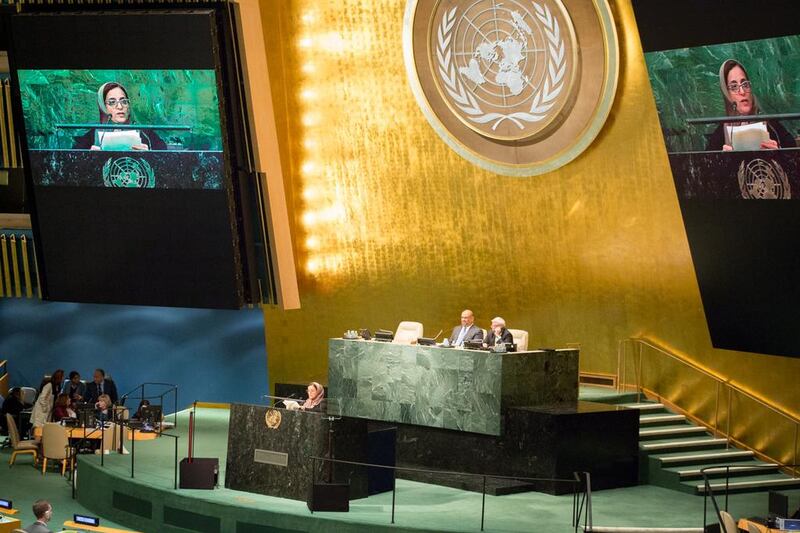The UAE welcomed the adoption of the 2030 sustainable development agenda by UN member countries and called on the international community to find new ways to fund the ambitious framework.
“Access to clean energy, sufficient and affordable food, quality education and health care, sustainable economic growth, healthy ecosystems, increased resource efficiencies – all these issues resonate strongly with the UAE,” said Sheikha Lubna Al Qasimi, Minister of International Cooperation and Development (Micad), during a speech to the UN general assembly on Saturday evening.
At the Sustainable Development Goals 2015 Summit in New York, Sheikha Lubna pledged “to implement the 2030 development agenda in a manner consistent with the UAE’s international obligations and commitments”.
On Friday, the UN’s 193 members unanimously adopted the “2030 Agenda for Sustainable Development” – a blueprint aimed at ending poverty and reversing the effects of climate change in 15 years.
The UAE has already shown “strong commitment to sustainable development” through its domestic focus on increasing clean energy production and consumption, and promoting the participation of women in the economy and society, among other steps, Sheikha Lubna said.
The 17 goals “will continue to reinforce and pave our pursuit for sustainable development”.
According to Micad, the UAE will establish a framework to monitor and report its progress on the goals.
Sheikha Lubna also said the UAE pledges to “leave no one behind and to shift the world onto a sustainable and resilient path”. As the UAE will automatically meet many, though not all, of the development goals, one of its primary roles in the 2030 plan will be as a donor to the massive undertaking.
Some estimates put the cost of implementing the goals at over US$1 trillion (Dh3.67tn) annually.
“Our contribution already has supported a number of core areas of the 2030 development agenda, including infrastructure development, health care provision and renewable energy aid as well as critical humanitarian assistance,” she said.
For the past two years, the UAE has been the most generous donor in the world based on aid as a percentage of gross national income, but low oil prices may make the country more conservative in its budgeting.
The scale of the plan will require the international community to “look beyond the traditional methods of resource mobilisation, which the UAE believes is a critical factor in delivering the 2030 development agenda”, Sheikha Lubna said. “We must forge new partnerships and be innovative in order to access previously untapped sources of development finance and investment.”
The volume of UAE global aid in recent years enhanced the UAE’s position in negotiations over what should be included in the sustainable development goals (SDGs), according to Micad. The ministry will soon release a strategy outlining how UAE aid will be used towards the 2030 goals.
The UAE led the 22-country Arab Group at the negotiations over the SDGs, and pushed in particular for goals on gender equality and sustainable energy.
The three-day summit, which ended on Sunday, was held during the annual UN general assembly, and attended by a UAE delegation that included Lana Zaki Nusseibeh, Ambassador to the United Nations; Dr Thany Alzeyoudi, Director of Energy and Climate Change in the Ministry of Foreign Affairs; Najla Al Kaabi, Undersecretary Assistant for International Cooperation from Micad; Razan Al Mubarak, Secretary General of the Environment Agency – Abu Dhabi, and Majid Al Suwaidi, Counsellor at the UAE Mission to the UN and lead negotiator on climate change.
tkhan@thenational.ae





